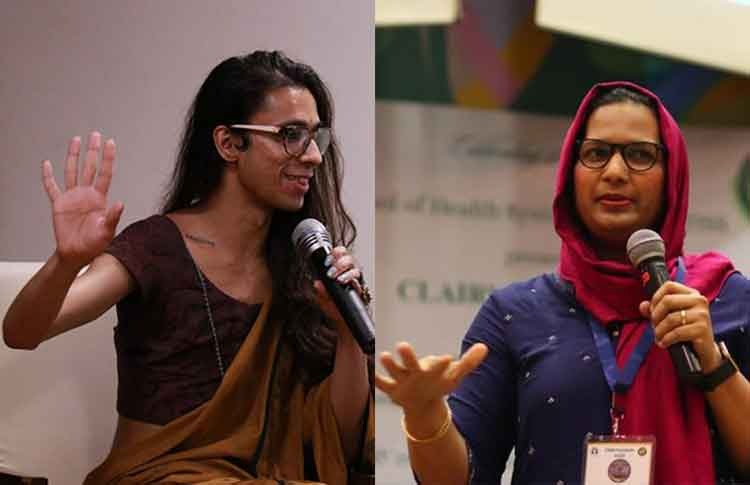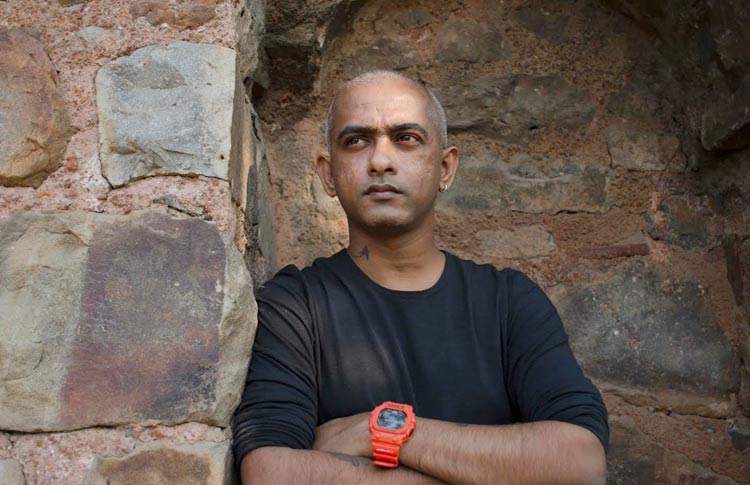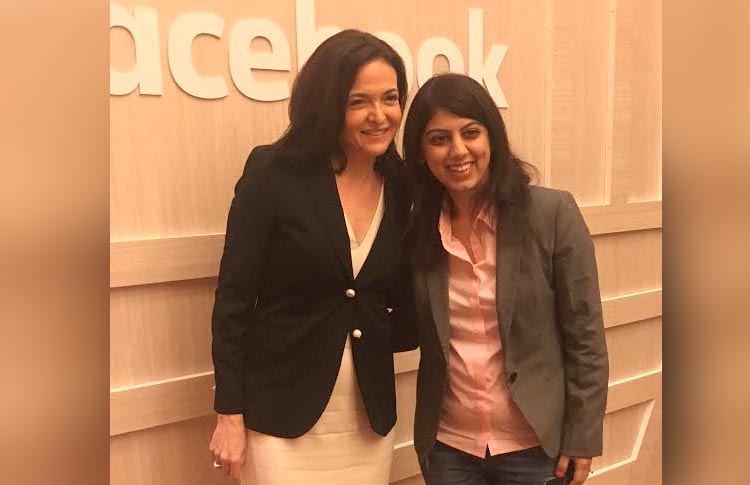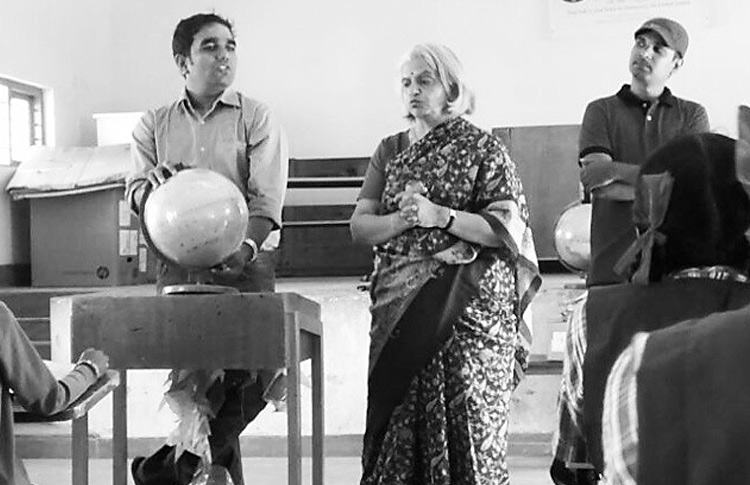Queer Educators Discuss Different Shades Of Marginality In Universities
- IWB Post
- March 3, 2023

Going to a university for higher education is a rite of passage in every student’s life. Many of us often cross geographical boundaries to be in our dream institutions. While we may find ourselves away from home, an inclusive and diverse campus would not only help us feel at home but would also help us understand what home means for people inhabiting different cultures and identities, thus making us more accepting.
However, in the last few years, Indian universities have become increasingly intolerant of differences. From polarization over hijab in Karnataka colleges to the patriarchal invasion of the privacy of an educator at Kolkata’s St Xavier’ University, the campuses in India have shown myriad shades of exclusivity and insularity. It is unfortunate that the divided and intolerant society we inhabit today is also manifesting itself in the educational campuses – places that are meant to be a melting pot for diverse identities and provide a safe space for self-expression.
In our insightful conversation with queer professors, Doctor Aqsa Shaikh and Vikramaditya Sahai, the two briefly walked us through their struggles with expressing their identity/transness in universities and extensively foregrounded the larger institutional problems that make campuses hostile for everyone. Their grassroot as well as small contributions in making the university campuses more accessible to students across all social constructs opens up a glimmer of hope.
Doctor Aqsa Shaikh is an associate professor of community medicine at Hamdard Institute of Medical Science. She was the first and only transgender woman who headed a Covid-19 vaccination center. Professor Vikramaditya Sahai taught gender studies at Ambedkar University in Delhi. They worked extensively to draft a manual in the NCERT curriculum concerning gender sensitization and inclusivity.
Discourses on sexual orientation and gender remain an issue of moral panic in almost every education institution in India, especially the ones in rural areas or small towns. How did you navigate the heteronormative and cisnormative staffroom and classroom while not changing the way you embrace your identity?
Aqsa: I would like to answer the question by going back to the time when I was a student. I was a medical student at a public university in Mumbai in the early 2000s. I decided to talk about my gender identity to my friends and teachers in the third year of my studies, and even though they heard me, some of them were still not willing to understand or talk to me. I had to tell them by placing paper chits in their books because they were not even ready to have a conversation about these issues in person. I was made to feel that I had done something wrong.
When I came for my post-graduation degree in the same college in 2007, most of the people around me were getting married and as a single person I heard conversations about something being wrong with me. No one understood me even then and in fact, my friends asked me why I could not be a man. In 2013, I joined Jamia Hamdard University, a Muslim minority, private university in Delhi as a faculty member. Muslim communities often see homosexuality as a sin. However, surprisingly, transness is well accepted in a certain section of the Muslim community. So, when I started identifying myself as a transwoman to some of my friends and colleagues, my gender identity was accepted but they hoped that I was a heterosexual being. The toughest time I had in university lasted for two years when I was on hormone therapy to biologically transition into a woman. I looked androgynous and did not seem to be a quintessential man or a woman. It was during this time that the attitude of students and colleagues towards me came out full blown. At every point of time, I was told that I was a role model for my students and my choices were setting a bad example for them. I had to play the role of an obedient daughter-in-law as a teacher.
Now, it’s been four years since I changed my gender legally. Most of the people around me treat me as a cisgender woman and accept me – and that is a reflection of the fact that our society has double standards. When a person fits into their idea of a typical man or a woman, they are accepted but when their self expression does not align with the societal view, then it is problematic. I also realized at that time how big a role the other aspects of intersectionality also play. During my transitory phase, I started wearing hijab to hide a bald spot on my head and that is when I noticed the struggles of women wearing hijab in educational institutions. Women wearing hijab and nakabs around me were not allowed to give viva examinations on the pretext that such a piece of clothing would hinder clear communication. Another facet of intersectionality I discovered was mental illness. I have been a survivor of depression and I was on antidepressant pills for a long time. When I opened up about taking medication for my mental wellbeing, I was suddenly perceived to be a weaker human being. I was deemed unfit for any position of charge including administrative duties and duties for the anti-ragging committee. I realized that as a Muslim trans woman, who was battling with mental illness, I was oppressed by multiple factors associated with my identity. At the same time, however, it also inculcated great empathy in me.
In medical colleges, a lot of students suffer from mental disorders and often there are no conversations around the same. Being in a position of power as a teacher has helped me communicate mental health concerns to my students and has given me a platform to initiate discussions on the struggles faced by a lot of marginalized communities.
Vikram: There is no extraordinary marginality that trans people suffer. This marginality is a shared marginality and it emerges not simply on grounds of identity or appearance but also in terms of what we desire from universities. However, I must also emphasize that, except perhaps for trans people and disabled folks, universities are actually the only places where some diversity can be found. Universities are the only spaces where women outnumber men and also the only site where because of the history of reservation we can see Dalit, Bahujan, Adivasi students coming up. One of the reasons why universities can be particularly frustrating is because they are one of those rare spaces where we can expect some bit of care and regard. The regard and rights, however, were not served on a platter but were fought for. Right from reservation to women’s rights as aimed by the Pinjra Tod movement, all of these things came hard earned. Thus, universities are highly ambiguous. They are fraud and contested places, but they are also spaces of hope and optimism.
The question about navigating the university as a trans person is a little complicated. I will use the example of bathrooms to talk about it. The worry around universal bathrooms is that trans people are men who will use the bathroom to attack cisgender women. In our society, contrary to all evidence produced by the NCRB – 97% of the sexual violence cases are done by a perpetrator known to the victim, the imagination is that there is always some lurking man behind the bushes who will rape her. Post Nirbhaya, people assume that there are some strangers from “other communities”, which might include Dalit, Adivasi, Muslim communities, that are bound to rape our women. It is this complicated machinery of caste, religious patriarchy, which combines with bio essentialist attitude about men and women, becomes oppressive.
The conversation about trans people in the university is as simple as a conversation about the right to the bathroom. It Is something where multiple forces of oppression combine. If we just make it a conversation about cisgender and transgender people, then we tend to overlook all these multiple factors. There can be no spaces for trans people unless there are liberatory spaces for men and women in the university.
Whenever we talk about inclusivity of queer community in universities, we often consider that from a student’s point of view. The emerging queer collectives in universities are limited to the student probably, because it is assumed that educators have more autonomy over students. Is that really true or are teachers even more subjected to scrutiny? Do you think it is more difficult for educators to embrace their identity than it is for students because there are no avenues for them?
Aqsa: A teacher does have the power to make certain decisions in their lives by themselves and that power comes with financial independence. A student in that aspect might not be as autonomous as a teacher and may have to rely on the opinions of their parents. However, educators are always concerned with their job security. They are in constant worry about whether or not their teaching contract will be renewed if they deviate from the norms or come out as a queer person. Around 85-90% of the teaching and non-teaching staff at my workplace is employed on a contractual basis. Many times students do not have that kind of insecurity.
A student who is paying their fees in a timely manner will not be removed from a university, especially a private university if they come out as queer because the university is also dependent on them. There are also certain laws that will protect the student throughout their time in the university. For queer educators, rights like paternity leaves, insurance for them and their partners, healthcare benefits for their surgeries are an extremely far-fetched idea when it’s always the insecurity of their contract that plays in their mind.
Vikram: I agree with everything that Aqsa is saying. I also feel that it is not a question of being a trans teacher or not. I think the larger question is about how safe does everyone inside the university feel when they make non-normative choices. The criminalisation of student unions coupled with increased precarity makes everyone, whether a teacher or a student, feel unsafe on the campus. Both students and teachers suffer from anxiety because their decisions feel so weighted to them and they are also constantly evaluating their next step.
In one university, I might be able to wear a saree but once that contract ends, can I wear a saree in an interview panel is also a question that needs to be considered because every step gets monitored.
When we make decisions that involve disobeying our families, some of us cut ourselves off from property, financial stability and also from the only structures of care and well-being. Because we do not have employment not just in universities but also at large, no pensions or securities, the desire to become safer in our decisions as a student or a teacher becomes our own responsibility alone. It’s not that someone is sitting with a gun or bullying me or making jokes about me that makes me feel less trans but it’s the fact that I am only calculating my life in terms of cost benefit analysis which makes transness impossible.
Actually, the evidence of transness shows that no matter the precarity, no matter the poverty, no matter the stakes, trans people still choose to be trans. That will can either stem from a sense of conviction or from a sense of gender dysphoria. But, for trans people, who do not share a strong feeling of dysphoria, the possibility of transness becomes limited in universities. Sometimes, we unconsciously give into the norms by deciding not to conduct ourselves in a certain manner on some day. It’s similar to how cisgender women decide what they will wear depending on their routine or their means of transport. When you already have the pressure to be a decent student, to earn an income, when universities have no infrastructure, the decision to be a hijab wearing Muslim woman or to be a trans woman becomes overwhelming. On some days we can defy these pressures and be ourselves, but on some days we really cannot. As I said, the question is not about being trans but about how we make our universities offer more protection to everyone who is a part of it. This may include strengthening the anti-sexual harassment committee, improving curriculum and employability, etc. At the end of the day, we are not just trans people but we have other identities of caste, class, religion intertwined, too, and it’s important that universities are inclusive of those aspects, as well.
How different do you think your experience as students would have been if you had a queer educator?
Vikram: The question reminds me of an initiative that I started called ‘Mummy ki Saree Project’, which involved taking sarees from mothers and offering it to trans people.
A part of the intellectual challenge that the project offered to me was to pay attention to the varied types of grammar by which something like transness or queerness could find a way in other people’s lives. It does not always enter as allyship or solidarity or knowledge and respect for pronouns. Sometimes, it exists in smaller registers that we may not usually identify as trans. What made university stifling was that there seemed to be no grammar in which transness was made possible and there was not even a feminist grammar in which I could find a resonance.
It would be great if trans people are employed in general and not just in universities. But, I do not think that a teacher or a person has to be necessarily trans to affirm trans rights. There are a lot of ways in which one can support trans people and that can be taken up by educators across all identities. With a few trans people now coming to the universities, it has become only their work to make campus more inclusive and support queer students. I do not think I have to wait for a disabled student to come to the class to initiate a conversation about accessibility in the classroom; I can start it in my capacity too. Similarly, women did not wait for universities to get rid of patriarchy – and then enter into one. They entered, fought and shifted a few things.
When we place the onus of standing up for queer students only on queer educators, we enable everyone else to evade that sense of responsibility. The university at large has to work on its infrastructure, as I previously mentioned, to make the campus more inclusive. The infrastructure will stand the test of time even as supportive educators retire.
Aqsa: Yes, a queer educator might have made things easier, but at the same time I want to credit a lot of the support that I received on the campus before the NALSA judgment to cisgendered women and other marginalized groups. When I started medical consultation for hypertension in the third year of my undergraduate studies and discovered my gender identity, many women around me in the campus and the women faculty members in the psychiatry department helped me navigate the discovery of my gender identity. I think patriarchy was the common perpetrator between us. We shared a desire to live our lives against the wishes of our parents and of society. They could resonate with my small struggles that included not being able to dress or carry ourselves in a certain manner due to surveillance.
I also want to highlight the support that came from cis men and romantic partners in my life. Often, we talk a lot about the toxic masculinity exhibited by cisgendered men but at least in my life, my male friends really had my back. There are spaces that I could not have navigated as a single trans woman if I did not have a bunch of male friends around me. This support sustained me throughout my life as a student in the university. It is important that we talk about the backing received from cisgendered people, too, while recognising the roles played by the fellow members of the community.
Professor Vikram taught Gender studies and Literary art at Ambedkar University. These are domains that do facilitate discussions about queerness. Doctor Aqsa, you teach community medicine and Public health. Medical science doesn’t really invest itself into discourses about gender or sexuality, but your teaching interests include transgender medicine and so you have tried revising the curriculum and making it more inclusive. How has this journey of bringing this change been for you?
Aqsa: I am still on that journey. The trigger for that revision came when I was admitted in the Covid ward as a trans woman. The doctors in that ward had committed some medical errors while examining my condition because they did not take into account my medical and surgical history as a trans woman. My fellow researchers and I wondered then that if this could happen to someone who the doctors clearly know is a trans person, the situation was so much more grim for patients who were not out with their trans identity. We then researched about the course taught at medical colleges, collaborated with a couple of other universities and launched a programme to change the medical curriculum to make it more inclusive.
In a huge country like India, changing the curriculum is a huge process and we are still working on it. As we had progressed with this journey, a lot of testimonials from other doctors, students, healthcare professionals who identify as trans or non-binary started pouring in wherein trans people going through the process of transition described how they felt at transphobic hospitals. We started talking to them and they supported us wholeheartedly.
I think it’s very difficult to unlearn certain things for doctors, probably, because they had been exposed to a conservative curriculum when they were medical students. They were taught that homosexuality was a sexual deviation and that transness was a gender identity disorder. Every non-normative identity was pathologized. Hence, it is difficult to initiate such conversations with them. But, I do have great hopes from the current and upcoming batches of medical students who are likely to be more open to conversations around gender expression and identity.
What policies do you think the university administrators can make to make the college campus more inclusive?
Aqsa: To give the administration the power to decide the budget and policies is to hand over power to them without much responsibility, whereas education per se should help in demolishing these hegemonic structures. The policies need to follow a bottom-up approach and incorporate voices from the margins, and from people who are not in the university but should have been in the university. I don’t say that in order for universities to be inclusive, the students alone should frame the policies because the students who have been able to come to the university have a certain level of privilege.
I think we should also take into account the views of the people who have been deprived of that education. For instance, if I talk about making campuses trans inclusive, I don’t only want the voices of trans students but also the voices of the hijra community who could not even go to a school, let alone a university. We need to listen to them to know at least how the next generation of the Kinnar community can enter the campus. Policies need to pull down the existing authoritarian structures, especially for the educational institutes. The administration should be the implementers and not the decision makers here.
Written by- Tripti Moolchandani
- 0
- 0












